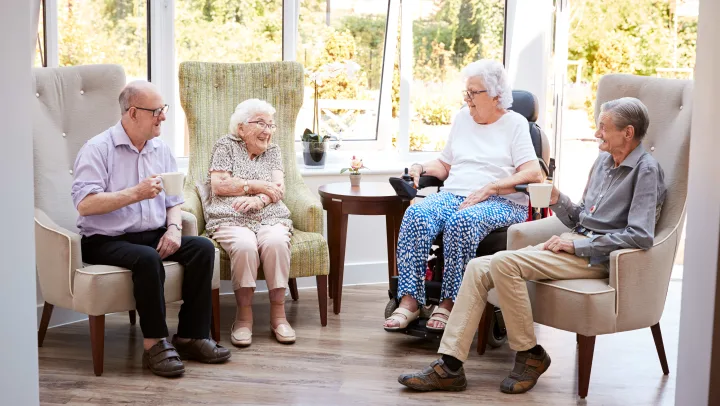The Role of Assisted Living in Offering Specialized Look After Mental Deterioration Patients
The arrangement of specialized care for dementia people within assisted living centers is progressively identified as an important component of reliable dementia monitoring. These atmospheres are developed to address the special cognitive and psychological difficulties faced by people with dementia, offering customized support that advertises security and well-being.
Recognizing Dementia Treatment Needs
Recognizing the care requirements of individuals with mental deterioration is important for providing efficient assistance and improving their top quality of life. Mental deterioration is a modern neurological problem that impacts cognitive features such as memory, reasoning, and communication. Individuals with dementia usually require help with day-to-day activities, individualized care plans, and emotional assistance.
Reliable dementia care includes identifying the unique obstacles encountered by each individual. This includes comprehending the phases of mental deterioration, which can range from light cognitive disability to advanced stages needing detailed aid. Care needs might encompass support in handling everyday regimens, drug adherence, and keeping social communications to avoid seclusion.
In addition, sensory excitement and acquainted settings can significantly enhance the well-being of people with dementia. Caretakers must be trained to identify behavior adjustments and use methods customized per individual's choices and past experiences. Methods such as validation therapy and memory can aid connect effectively and foster a feeling of security.
Inevitably, efficiently dealing with the treatment demands of people with mental deterioration needs a caring technique, ongoing training for caregivers, and a commitment to keeping self-respect and respect throughout the caregiving process.
Advantages of Assisted Living

Assisted living advertises social communication amongst residents, fostering a sense of community and belonging. Engaging with peers can minimize feelings of seclusion, which are usual in those living with mental deterioration.
Furthermore, several nursing home offer assistance with daily activities, such as medicine administration, bathing, and meal preparation. This support permits homeowners to keep their independence while guaranteeing their health and well-being are focused on. Inevitably, assisted living functions as a beneficial source, balancing care and freedom for people with mental deterioration and their households.

Specialized Programs and Tasks
In addition, art and songs therapy play significant duties in promoting creative thinking and psychological expression (Assisted Living). Involving residents in paint, crafting, or music sessions can provide therapeutic benefits, assisting to reduce anxiousness and enhance state of mind. Exercises, such as mild exercises and dancing sessions, are also critical, as they promote mobility and physical wellness while encouraging social communication amongst locals
Organized daily routines are often developed to offer a feeling of stability and predictability for individuals with mental deterioration. These regimens can include arranged dish times, group tasks, and personalized care strategies that satisfy private passions and abilities. By producing an improving environment loaded with customized tasks, assisted living facilities not just boost the lifestyle for dementia individuals yet also promote a feeling of area and belonging.
Educated Staff and Support
Furthermore, qualified team are equipped to execute tailored care strategies tailored to each homeowner's preferences and abilities. This personalized technique cultivates a sense of autonomy and dignity, permitting residents to take part in significant tasks that boost their top quality of life. The team also play a vital role in checking health and wellness, promptly identifying any changes in condition that may require medical attention.
In addition to direct care, qualified staff supply psychological assistance to citizens, assisting to relieve sensations of confusion and anxiety that often accompany mental deterioration. Their thoughtful strategy develops a caring atmosphere where locals really feel valued and understood - Memory Care. Ultimately, the knowledge and devotion of experienced staff are essential in providing thorough care that satisfies the complicated demands of individuals coping with dementia in assisted living settings
Family Participation and Resources
Family members involvement plays a considerable duty in the care of individuals with dementia in assisted living centers. Engaging member of the family in the treatment procedure not just improves the psychological health of the homeowner however also cultivates a collective environment where treatment plans can be customized to specific requirements. Families can supply important understandings into the choices, history, and actions of their loved ones, which can educate caregivers and bring about more individualized care techniques.
Moreover, helped living facilities commonly offer resources for family members, such as support system and educational workshops. These resources can aid families comprehend mental deterioration, improve interaction strategies, and create coping mechanisms. Participation in these programs can encourage family members, outfitting them with the tools required to sustain their enjoyed ones effectively.
Additionally, routine interaction in between family members and staff is vital. This recurring discussion allows households to stay informed regarding their liked one's progression and any kind of changes in care plans. Eventually, a solid collaboration in between family members and helped living centers cultivates a setting of trust and understanding, ensuring that individuals with dementia receive the specialized care they are worthy of while preserving their family members links.
Conclusion
In verdict, helped living facilities play an important duty in dealing with the one-of-a-kind demands of mental deterioration people through individualized care and support. Ultimately, assisted living provides crucial sources that substantially sites enhance the quality of life for those living with dementia.
Comments on “Specialized Memory Care services for seniors with Alzheimer’s and dementia.”